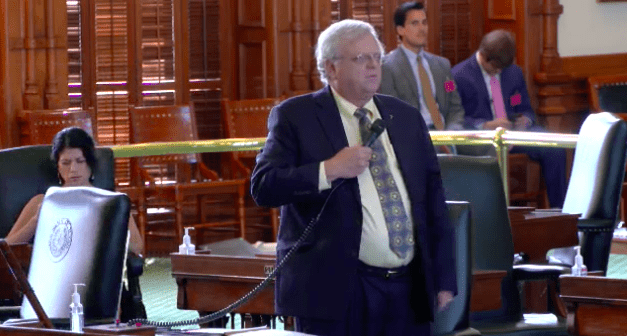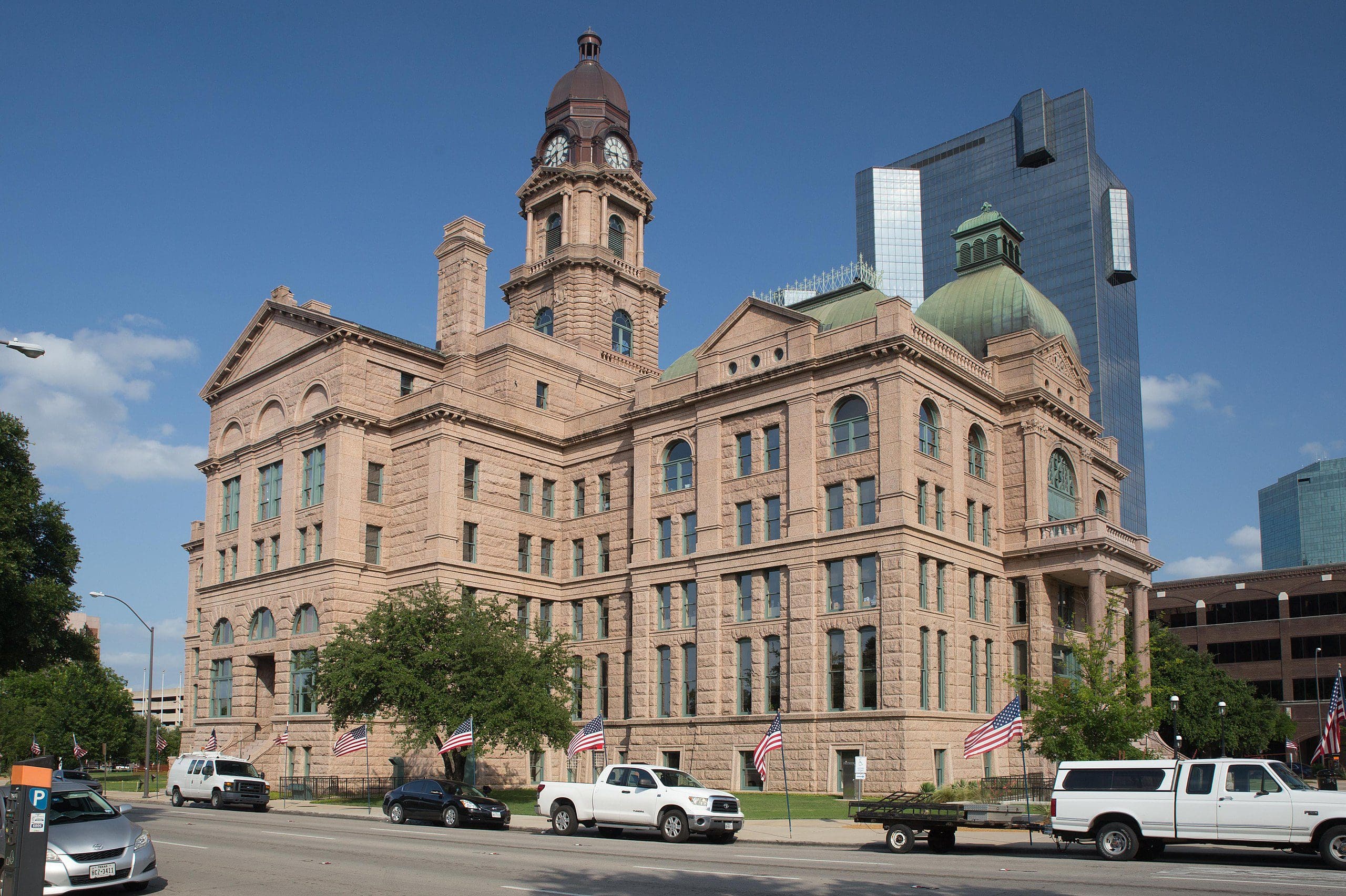Amid “shockingly low” public confidence in elections, Texas senators passed an election audit bill this week that would give citizens a way to resolve questions about discrepancies in future elections and initiate audits of November 2020 election results.
Senate Bill 47 by State Sen. Paul Bettencourt (R–Houston)—endorsed last week by former President Donald Trump—passed the Senate on Tuesday.
The election audit bill now awaits action by the state House. Senators passed a similar bill by Bettencourt during the second special session last month, but the House didn’t act on it.
Trump called SB 47 “legislation that authorizes Texans to initiate a strong and real forensic audit.” Bettencourt said it’s “about asking questions and getting answers,” noting senators approved his previous audit bill before Trump’s public endorsement.
Answering Unresolved Questions
SB 47 creates a civil complaint procedure for initiating county-level reviews of certain non-criminal election irregularities—a remedy not currently available to citizens. If election officials fail to explain discrepancies and resolve issues, that could trigger an audit and corrective action by the state.
Bettencourt said there are examples of major vote discrepancies “from the Rio Grande all the way to the Red River.”
One of several unresolved discrepancies described by senators happened in Harris County, where Bettencourt lives: 1,800 more votes were cast than voters who signed in to vote during the 2020 election.
That’s more than enough votes to affect the outcomes of many legislative and local races.
“As a former election official, I can’t imagine it’s been almost a year that we’ve known about an 1,884-vote discrepancy,” Bettencourt said during Monday’s public hearing on his bill. He served as Harris County’s voter registrar from 1998 to 2008.
“When you have an irregularity, you have to be able to ask a question about it, and you have to be able to get an answer,” he said on the Senate floor on Tuesday.
Civil Reviews of Election Irregularities
SB 47 empowers certain people involved in the election process—candidates, party chairs, election judges, and heads of ballot measure committees—to question local election officials about “irregularities” that wouldn’t otherwise be addressed as part of an election contest or criminal investigation.
Questions can relate to actions by an election officer that appear to violate election code, irregularities in precinct results, and inadequate or irregular election documentation.
Local election officials would have a set period of time to review the issue and explain the discrepancy or irregularity.
If the issue isn’t resolved, the secretary of state’s office then determines if there’s a need for an audit.
Bettencourt said the audit would be “forensic” rather than “risk-limiting” because it would look at the root cause of a specific election irregularity and would result in a remedy for future elections.
Following an audit, the secretary of state’s office would report its findings to the person who requested it and the local election official. The SOS could assess $500 fines for any violations not remedied by the officials and intervene to fix problems.
2020 Election Audits
SB 47 also includes a “lookback” provision allowing a political party chair to request an audit of 2020 election results. The county clerk would appoint an audit committee made up of local voters with specific expertise.
The audit would include a manual review of all ballots from any precincts or polling places where the number of ballots cast exceeded the total number of voters accepted for voting, plus a random selection of ballots cast in three to five races. Auditors would also have access to all precinct election records.
The secretary of state would issue a public report on any differences in results, likely causes, and recommended measures to avoid similar discrepancies in the future.
Bettencourt said the audits would be conducted using internal resources.
“This is not an Arizona-style audit where we’re hiring a third party at a higher expense than what we already have the ability to review,” he said.
“The important thing is that all these questions should be, and must be, answered.”
Joint Oversight Committee
An amendment to SB 47 by State Sen. Bob Hall (R–Edgewood) establishes a joint House-Senate oversight committee to monitor local election officials’ compliance with the reviews and audits, and to report findings and recommendations for legislative action.
On Tuesday, Hall said one of the biggest problems we have is the declining public confidence in the outcome of our elections, which leads to voter apathy and reduced turnout. He said added oversight and public reporting would increase transparency in the audit process.
“Nothing increases people’s confidence more than transparency.”
Public Input
Longtime election integrity advocate Alan Vera, who heads the Harris County Republican Party’s Ballot Security Committee, told Senate committee members Monday that voters become suspicious when they see inconsistent election data and they have no avenue for finding out what happened.
“When it happens election after election after election, then they lose confidence in our elections,” he said. “That’s what this bill is about: finding out what practices and procedures are resulting in serious discrepancies in the election data and fixing them.”
Vera listed multiple discrepancies seen in Harris County, including more ballots than voters from both in-person and mail-ballot voting, errors in election logs, and voters given the wrong ballots.
“These discrepancies do affect voter confidence,” he said. “This bill allows us to get explanations for the data.”
Chad Ennis with Texas Public Policy Foundation’s Election Protection Project agreed with Hall that Americans’ confidence in elections is “shockingly” low. He said it’s a bipartisan issue and one that’s not new.
He said polls show only 58 percent of voters believe the 2020 election was free and fair, leaving two out of five who think the election lacked integrity—including 30 percent of Democrats. In 2019, 60 percent of voters lacked confidence in elections.
Ennis said SB 47 is the best of the audit bills being considered because it measures specific problems and proposes ways to fix them. It also looks forward to future elections, not just back at 2020.
Disability rights advocate Chase Bearden told senators his coalition opposed the bill because it could be “weaponized” by party officials. He said reviews of election irregularities shouldn’t be “aired as dirty laundry”; instead, problems within local elections offices should be resolved between the secretary of state and party and county officials, not made public.
What’s Next
The Senate passed SB 47 on Tuesday by a vote of 17-14. The House received the bill on Wednesday.
A similar audit bill, House Bill 16, was filed by State Rep. Steve Toth (R–The Woodlands) and also endorsed by Trump. A different Toth bill, House Bill 17, calls for an independent third-party forensic audit of ballots and other precinct election records in the state’s 13 most populous counties.
As of Friday, House Speaker Dade Phelan hadn’t acted on either of Toth’s audit bills or referred SB 47 to a committee for further action.
The ongoing third special session will conclude by October 19.





